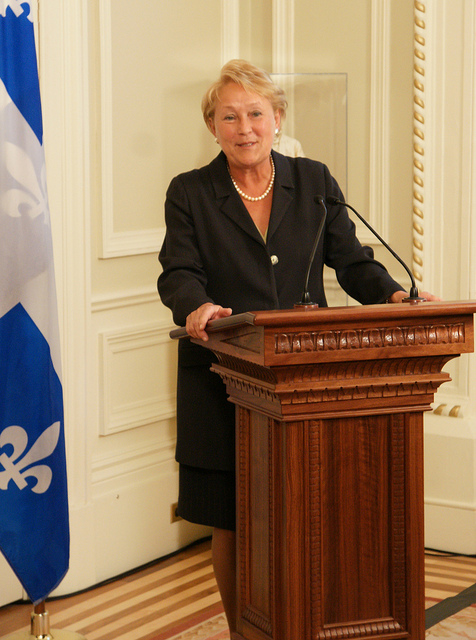The defeat of the minority PQ government led by Pauline Marois means Quebec will have a majority Liberal government led by Philippe Couillard. It does not mean the sovereignist movement is dead or that Quebec nationalism is a diminished force in Canadian politics.
Of the 125 seats contested, the Liberals won 70, the PQ won 30, the Coalition for the Future of Quebec (CAQ) 22, and Québec Solidaire 3.
Pauline Marois lost her own seat, and resigned as PQ leader. The defeat of the PQ government amounts to a significant “no” to its strategy of holding a referendum on independence when it decides the Quebec population is ready for one.
The party will have to recognize that after two failed referendum campaigns, the Quebec population has no appetite for a third trip to the ballot box to vote on a question devised by the PQ about the future of Quebec. Expect the party to focus instead on developing a proposal for adopting a Quebec constitution, a position they had set aside and that had been adopted by Québec Solidaire.
The Liberal election campaign was an unexpected triumph. Its theme was Ensemble (all together); its message was “let’s talk about the things that matter” (les vrais affaires); its focus was on the economy, and a pledge to create 250,000 jobs over the next five years.
Philippe Couillard started strong, combating the PQ as a purveyor of fear about the future, and the Liberal campaign did not falter.
Couillard offered his own nationalist vision of a Quebec strong, capable, confident in its abilities, and open to the world.
The Liberal leader faced a concerted attack on his character. A brain surgeon by profession, during his time working in Saudi Arabia, Radio-Canada reported he opened an overseas bank account in a tax haven. Couillard admitted negotiating a job with a health-services company — while still Minister of Health — was a mistake.
Despite doubts raised about his ability to lead the party in the months since he became leader in March 2013, Couillard crafted a positive message about Quebec, highlighting the successes of Quebecers, that contrasted with the PQ attacks on the other parties.
Pauline Marois called an unnecessary election. There was nothing particularly controversial about the PQ budget, its passage could have been negotiated with the opposition. All the parties represented in the National Assembly were close to agreeing on a version of the Quebec Charter, but the PQ chose not to compromise.
The PQ had a wider ambition than simply governing. It wanted to win a majority government, unite francophone Quebec, marginalize the third party Coalition for the Future of Quebec, and leave the Liberals isolated, supported mainly by anglophone and allophone voters.
By calling an election to get approval for a Quebec Charter, Pauline Marois expected a snowball effect. New nationalist sentiments would emerge (perhaps following a challenge to the Charter from the Supreme Court of Canada) permitting her to dream of a campaign leading to Quebec independence.
Marois, one of the most experienced political leaders ever to become premier in Canada, succumbed to the same temptation as her mentor Jacques Parizeau. Instead of building a strong government record, concentrating on governing the province, she wanted more, a chance at entering the history books as the head of an independent Quebec.
While as many as 40 per cent of Quebecers share her sovereignty dream, no more than 30 per cent of the population was prepared to see another divisive referendum campaign.
The PQ could not make the CAQ go away; it garnered 23 per cent of the popular vote. The PQ total of 25 per cent was the lowest since its debut as a party, largely because it bled support to the CAQ, a party that opposed a referendum but held out sovereignty as a future option.
The progressive sovereignist party Québec Solidaire attracted 8 per cent of the vote. With Marois backing off talking about sovereignty as the PQ fell in the polls, the QS made an outright claim to be the sovereignist option, taking further support away from the PQ.
Philippe Couillard has a genuine attachment to Canada and a sincere desire to build new bridges to the other provinces. It will be interesting to see how his government is received in Ottawa and other provincial capitals. No one in power has thought seriously about renewing federalism, but the new Liberal premier of Quebec is prepared to discuss it.
The Quebec political scene did not change as a result of the Liberal victory. If anything the divisions are deeper between competing visions than at any time in recent history.
Will the Liberal party go back to centrist politics or will it track right as it did under Jean Charest? The answer is not clear. Should it promote austerity, the Liberals can expect a short political honeymoon, and major opposition to its authority.
Duncan Cameron is the president of rabble.ca and writes a weekly column on politics and current affairs.
Photo: Parti Québécois/flickr




